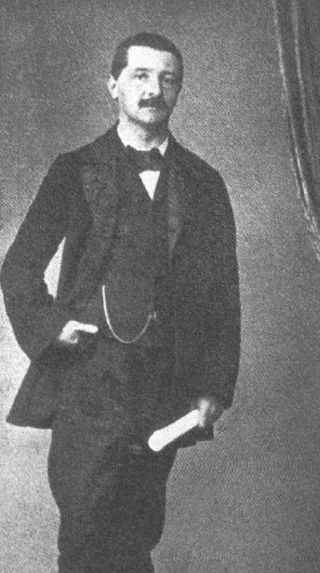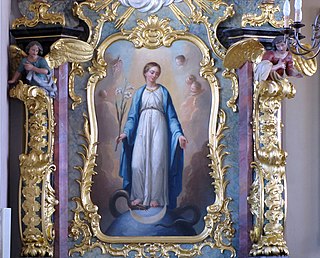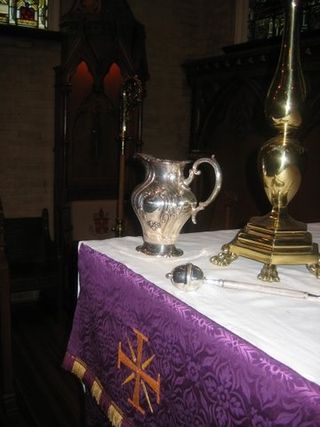
The Windhaager Messe, WAB 25, is a missa brevis composed by Anton Bruckner in 1842.

The Kronstorfer Messe, WAB 146, is a missa brevis composed by Anton Bruckner in 1843-1844.

The Messe für den Gründonnerstag, WAB 9, is a missa brevis composed by Anton Bruckner in 1844.

Ecce sacerdos magnus, WAB 13, is an 1885 sacred motet by the Austrian composer Anton Bruckner. It is a musical setting of the antiphon of the same title.

Virga Jesse, WAB 52, is a motet by the Austrian composer Anton Bruckner. It sets the gradual Virga Jesse floruit for unaccompanied mixed choir.

Tota pulchra es, WAB 46, is a sacred motet by the Austrian composer Anton Bruckner.

Christus factus est, WAB 11, is a sacred motet by Anton Bruckner, his third setting of the Latin gradual Christus factus est, composed in 1884. Before, Bruckner composed in 1844 a first piece on the same text as gradual of the Messe für den Gründonnerstag, and in 1873 a motet for eight-part mixed choir, three trombones, and string instruments ad libitum. The motet is an expressive setting of the gradual, influenced by Wagner's music.

Pange lingua, WAB 31, is a sacred motet composed by Anton Bruckner in c. 1835. It is a setting of the first strophe of the Latin hymn Pange lingua for the celebration of Corpus Christi.

The two Asperges me, WAB 3, are sacred motets composed by Anton Bruckner. They are settings of the Latin Asperges me, the antiphon used for the celebration of Asperges.

Dir, Herr, dir will ich mich ergeben, WAB 12, is a sacred motet composed by Anton Bruckner in c. 1845.

Libera me, WAB 21, is the first of two settings of the absoute Libera me, composed by Anton Bruckner in c. 1843.

Tantum ergo, WAB 43, is the second of eight settings of the hymn Tantum ergo composed by Anton Bruckner in c. 1845.

Tantum ergo, WAB 44, is the last of eight settings of the hymn Tantum ergo composed by Anton Bruckner in c. 1854.

Herz Jesu-Lied, WAB 144, is the second of two motets of Anton Bruckner's St. Florian period, which is of uncertain authorship. If Bruckner was the composer, it was composed presumably in 1845-1846.

The Two Aequali, WAB 114 & WAB 149, were composed by Anton Bruckner in 1847.

The two Totenlieder, WAB 47/1 & 47/2, are elegies composed by Anton Bruckner in 1852.

Salvum fac populum tuum, WAB 40, is a motet composed by Anton Bruckner in 1884.

Veni Creator Spiritus, WAB 50, is a motet composed by Anton Bruckner in c. 1884.

Inveni David, WAB 19, is a sacred motet composed by Anton Bruckner in 1868.

















